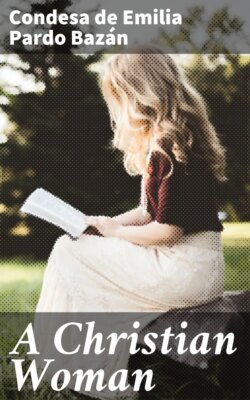Читать книгу A Christian Woman - condesa de Emilia Pardo Bazán - Страница 7
На сайте Литреса книга снята с продажи.
CHAPTER III.
ОглавлениеTable of Contents
One morning, or, rather, afternoon, almost at the end of the term, we rushed out of school, almost running from Turco Street to Clavel Street. You must remember that from eight o’clock, when we took our muddy chocolate, until half-past one, the hour when our drawing-class closed, our recitations came along one after the other; and we had nothing to sustain our strength, but now and then a sausage which we would surreptitiously purchase from the janitor, or some scrap which we would filch at the boarding-house and carry along. Smelling our lunch from afar, we mounted two steps at a time, and on entering the dining-room, I came face to face with my Uncle Felipe, who said to me, abruptly, “You must lunch with me to-day at Fornos’s. I imagine that eatables are scarce here.”
“I should be glad to go, but I have so much studying to do just now,” I answered, affecting reluctance.
“Bah, you’ll not lose a year’s time if you don’t study to-day. Come along, for we must have a talk—a talk about a great many things,” he added, with an air of mystery.
The truth is—and it would do no good to conceal it, because it will be made very evident in the course of this story—that I had not merely no affection or respect for my Uncle Felipe, but not even any sort of attachment or as much as gratitude for the favors he was conferring upon me. Quite the contrary. I know it does me no credit to say so, and that ingratitude is the ugliest of faults; but I know, also, that I am not naturally ungrateful, and in order to justify, or at least explain myself, I will sketch in silhouette my Uncle Felipe’s physical and moral characteristics, to do which I must allude to some matters that are of the nature of family secrets.
My baptismal name is Salustio, my paternal surnames are Meléndez Ramos, my maternal, Unceta Cardoso. That name Unceta indicates plainly that my mother’s father was a Basque, and came from Guipuzcoa, to be more exact; and Cardoso—that’s where the mischief comes in. It seems that the Cardosos of Marín—I was born in Pontevedra, and my mother’s family came from the little seaport of Marín—were a broken branch of the Portuguese trunk of Cardoso Pereira, a Jewish trunk, if there is such a thing. How did the fact come to my knowledge that my mother’s ancestors were Jews? Just find out if you can who tells these things to children. One day when I was nine or ten, unable to restrain my curiosity any longer, I asked my mother:
“Mamma, is it true that we belong to the Jewish race?”
With fire flashing from her eyes, she lifted her hand and cuffed my ears soundly, crying:
“If you say that again, I’ll break all the bones in your body!”
That chastisement left the impression in my mind that to be a Jew was a sore disgrace; and two or three years later, when one of my school-mates at Pontevedra threw it in my face, calling out,
